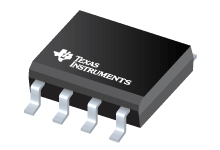Datasheet Texas Instruments THS3201DGN
| Manufacturer | Texas Instruments |
| Series | THS3201 |
| Part Number | THS3201DGN |

1.8GHz Current Feedback Amplifier 8-MSOP-PowerPAD -40 to 85
Datasheets
THS3201: 1.8-GHz, Low Distortion, Current-Feedback Amplifiers datasheet
PDF, 1.9 Mb, Revision: C, File published: May 29, 2009
Extract from the document
Prices
Status
| Lifecycle Status | NRND (Not recommended for new designs) |
| Manufacture's Sample Availability | No |
Packaging
| Pin | 8 |
| Package Type | DGN |
| Industry STD Term | HVSSOP |
| JEDEC Code | S-PDSO-G |
| Package QTY | 80 |
| Carrier | TUBE |
| Device Marking | BEN |
| Width (mm) | 3 |
| Length (mm) | 3 |
| Thickness (mm) | 1.02 |
| Pitch (mm) | .65 |
| Max Height (mm) | 1.1 |
| Mechanical Data | Download |
Replacements
| Replacement | THS3001IDGN |
| Replacement Code | Q |
Eco Plan
| RoHS | Compliant |
Design Kits & Evaluation Modules
- Evaluation Modules & Boards: THS3201EVM
THS3201 Evaluation Module
Lifecycle Status: Active (Recommended for new designs)
Application Notes
- Video Designs Using High-Speed Amplifiers (Rev. A)PDF, 438 Kb, Revision: A, File published: Feb 3, 2005
- Load Sharing Concepts: Implementation for Large-Signal ApplicationsPDF, 219 Kb, File published: Oct 5, 2011
Selecting a suitable large-signal swing operational amplifier driver for instrumentation or test and measurement applications can be challenging. In addition to developing the necessary theoretical background for load sharing, this report provides bench results to demonstrate the implementation and benefits of load sharing and output paralleling. - Large-Signal Specifications for High-Voltage Line DriversPDF, 195 Kb, File published: Jun 30, 2011
Output voltage swing, output current, and slew rate interact with many other specifications in operational amplifiers. This application note develops the definitions for each parameter and the relationship between important ac parameters such as large-signal bandwidth and distortion. - RF and IF amplifiers with op ampsPDF, 177 Kb, File published: Feb 28, 2005
- Noise Analysis for High Speed Op Amps (Rev. A)PDF, 256 Kb, Revision: A, File published: Jan 17, 2005
As system bandwidths have increased an accurate estimate of the noise contribution for each element in the signal channel has become increasingly important. Many designers are not however particularly comfortable with the calculations required to predict the total noise for an op amp or in the conversions between the different descriptions of noise. Considerable inconsistency between manufactu
Model Line
Series: THS3201 (14)
Manufacturer's Classification
- Semiconductors > Amplifiers > Operational Amplifiers (Op Amps) > High-Speed Op Amps (>=50MHz)
